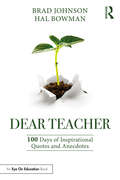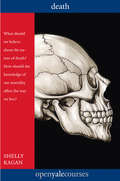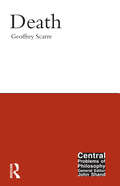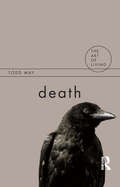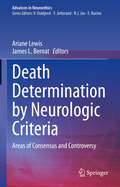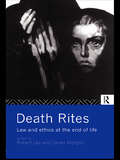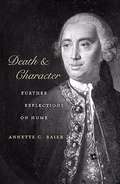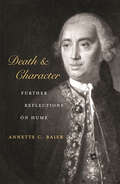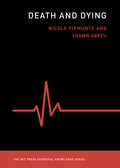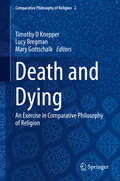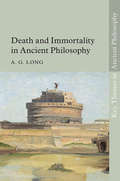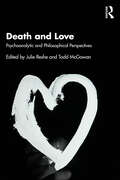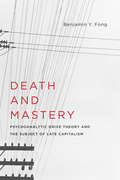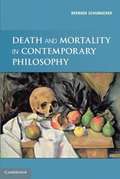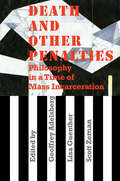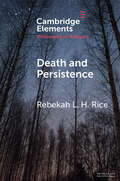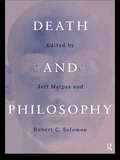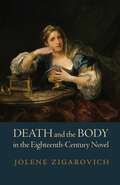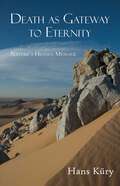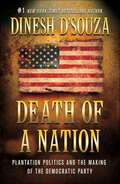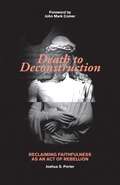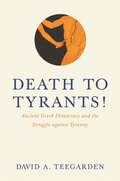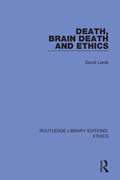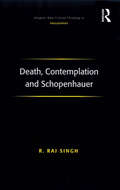- Table View
- List View
Dear Teacher: 100 Days of Inspirational Quotes and Anecdotes
by Brad Johnson Hal BowmanDear teacher, you are appreciated! This inspirational book, written by motivational speakers Brad Johnson and Hal Bowman, provides daily encouragement to thank you for all that you do in the classroom and beyond. Johnson and Bowman offer quotes and powerful stories for 100 days of the school year, highlighting topics such as celebrating small successes, bringing out the best in your students, knowing your worth, and being all in. The book is perfect for teachers of all grade levels, and for principals to buy their teachers for schoolwide morale, to keep teachers feeling their best. The uplifting advice will remind you why you’ve chosen this profession and the impact you have on others!
Death
by Shelly KaganThere is one thing we can be sure of: we are all going to die. But once we accept that fact, the questions begin. In this thought-provoking book, philosophy professor Shelly Kagan examines the myriad questions that arise when we confront the meaning of mortality. Do we have reason to believe in the existence of immortal souls? Or should we accept an account according to which people are just material objects, nothing more? Can we make sense of the idea of surviving the death of one’s body? If I won’t exist after I die, can death truly bebadfor me? Would immortality be desirable? Is fear of death appropriate? Is suicide ever justified? How should Ilivein the face of death? Written in an informal and conversational style, this stimulating and provocative book challenges many widely held views about death, as it invites the reader to take a fresh look at one of the central features of the human condition—the fact that we will die.
Death (Central Problems of Philosophy #15)
by Geoffrey ScarreWhat is death and why does it matter to us? How should the knowledge of our finitude affect the living of our lives and what are the virtues suitable to mortal beings? Does death destroy the meaningfulness of lives, or would lives that never ended be eternally and absurdly tedious? Should we reconcile ourselves to the fact of our forthcoming death, or refuse to "go gently into that good night"? Can death really be an evil if, after death, we no longer exist as subjects of goods or evils? How should we respond to the deaths of others and do we have any duties towards the dead? These, and many other, questions are addressed in Geoffrey Scarre's book, which draws upon a wide variety of philosophical and literary sources to offer an up-to-date and highly readable study of some major ethical and metaphysical riddles concerning death and dying.
Death (The Art of Living)
by Todd MayThe fact that we will die, and that our death can come at any time, pervades the entirety of our living. There are many ways to think about and deal with death. Among those ways, however, a good number of them are attempts to escape its grip. In this book, Todd May seeks to confront death in its power. He considers the possibility that our mortal deaths are the end of us, and asks what this might mean for our living. What lessons can we draw from our mortality? And how might we live as creatures who die, and who know we are going to die? In answering these questions, May brings together two divergent perspectives on death. The first holds that death is not an evil, or at least that immortality would be far worse than dying. The second holds that death is indeed an evil, and that there is no escaping that fact. May shows that if we are to live with death, we need to hold these two perspectives together. Their convergence yields both a beauty and a tragedy to our living that are inextricably entwined.Drawing on the thoughts of many philosophers and writers - ancient and modern - as well as his own experience, May puts forward a particular view of how we might think about and, more importantly, live our lives in view of the inescapability of our dying. In the end, he argues, it is precisely the contingency of our lives that must be grasped and which must be folded into the hours or years that remain to each of us, so that we can live each moment as though it were at once a link to an uncertain future and yet perhaps the only link we have left.
Death Determination by Neurologic Criteria: Areas of Consensus and Controversy (Advances in Neuroethics)
by James L. Bernat Ariane LewisThis book presents principal controversies over the determination of death by neurologic criteria (“brain death”). The editors and authors are exceedingly well-versed in this subject and are on the forefront of the current debates. The content is divided in the following disciplinary: philosophical (conceptual), medical, scientific, legal, religious, and ethical/social. Many of the topics feature pro-con debates, allowing readers to consider the merits of the arguments and decide their own position. The work is targeted to clinicians and nurses who treat critically ill and dying patients, organ donation personnel, ethicists and philosophers who write on end-of-life issues, and lawyers and legislative/public policy professionals who draft laws on death determination. It identifies and debates the essential controversies currently raging in academic and public policy circles over the medical adequacy, scientific validity, and conceptual coherence of death determination by neurologic criteria. Whether a professional or a student, the reader will be given a comprehensive course in the most pressing controversies and areas of consensus in the determination of death by neurologic criteria.
Death Rites: Law and Ethics at the End of Life
by Robert Lee Derek MorganFirst published in 2012. Routledge is an imprint of Taylor & Francis, an informa company.
Death and Character: Further Reflections on Hume
by Annette C. Baier<p>Reviewing Annette Baier's 1995 work Moral Prejudices in the London Review of Books, Richard Rorty predicted that her work would be read hundreds of years hence; Baier's subsequent work has borne out such expectations, and this new book further extends her reach. Here she goes beyond her earlier work on David Hume to reflect on a topic that links his philosophy to questions of immediate relevance—in particular, questions about what character is and how it shapes our lives. <p>Ranging widely in Hume's works, Baier considers his views on character, desirable character traits, his treatment of historical characters, and his own character as shown not just by his cheerful death—and what he chose to read shortly before it—but also by changes in his writings, especially his repudiation of the celebrated A Treatise on Human Nature. She offers new insight into the Treatise and its relation to the works in which Hume “cast anew” the material in its three books. Her reading radically revises the received interpretation of Hume's epistemology and, in particular, philosophy of mind.</p>
Death and Character: Further Reflections on Hume
by Annette C. BaierReviewing Annette Baier’s 1995 work Moral Prejudices in the London Review of Books, Richard Rorty predicted that her work would be read hundreds of years hence; Baier’s subsequent work has borne out such expectations, and this new book further extends her reach. Here she goes beyond her earlier work on David Hume to reflect on a topic that links his philosophy to questions of immediate relevance—in particular, questions about what character is and how it shapes our lives.Ranging widely in Hume’s works, Baier considers his views on character, desirable character traits, his treatment of historical characters, and his own character as shown not just by his cheerful death—and what he chose to read shortly before it—but also by changes in his writings, especially his repudiation of the celebrated A Treatise on Human Nature. She offers new insight into the Treatise and its relation to the works in which Hume “cast anew” the material in its three books. Her reading radically revises the received interpretation of Hume’s epistemology and, in particular, philosophy of mind.
Death and Dying (The MIT Press Essential Knowledge series)
by Piemonte Nicole Shawn AbreuAn examination of the contemporary medicalization of death and dying that calls us to acknowledge instead death's existential and emotional realities.Death is a natural, inevitable, and deeply human process, and yet Western medicine tends to view it as a medical failure. In their zeal to prevent death, physicians and hospitals often set patients and their families on a seemingly unstoppable trajectory toward medical interventions that may actually increase suffering at the end of life. This volume in the MIT Press Essential Knowledge series examines the medicalization of death and dying and proposes a different approach--one that acknowledges death's existential and emotional realities. The authors--one an academic who teaches and studies end-of-life care, and the other a physician trained in hospice and palliative care--offer an account of Western-style death and dying that is informed by both research and personal experience. They examine the medical profession's attitude toward death as a biological dysfunction that needs fixing; describe the hospice movement, as well as movements for palliative care and aid in dying, and why they failed to influence mainstream medicine; consider our reluctance to have end-of-life conversations; and investigate the commodification of medicine and the business of dying. To help patients die in accordance with their values, they say, those who care for the dying should focus less on delaying death by any means possible and more on being present with the dying on their journey.
Death and Dying: An Exercise in Comparative Philosophy of Religion (Comparative Philosophy of Religion #2)
by Timothy D Knepper Lucy Bregman Mary GottschalkThe medicalization of death is a challenge for all the world's religious and cultural traditions. Death's meaning has been reduced to a diagnosis, a problem, rather than a mystery for humans to ponder. How have religious traditions responded? What resources do they bring to a discussion of death's contemporary dilemmas? This book offers a range of creative and contextual responses from a variety of religious and cultural traditions. It features 14 essays from scholars of different religious and philosophical traditions, who spoke as part of a recent lecture and dialogue series of Drake University’s The Comparison Project. The scholars represent ethnologists, medical ethicists, historians, philosophers, and theologians--all facing up to questions of truth and value in the light of the urgent need to move past a strictly medicalized vision.This volume serves as the second publication of The Comparison Project, an innovative new approach to the philosophy of religion housed at Drake University. The Comparison Project organizes a biennial series of scholar lectures, practitioner dialogues, and comparative panels about core, cross-cultural topics in the philosophy of religion. The Comparison Project stands apart from traditional, theistic approaches to the philosophy of religion in its commitment to religious inclusivity. It is the future of the philosophy of religion in a diverse, global world.
Death and Immortality in Ancient Philosophy (Key Themes in Ancient Philosophy)
by A. G. LongDeath and immortality played a central role in Greek and Roman thought, from Homer and early Greek philosophy to Marcus Aurelius. In this book A. G. Long explains the significance of death and immortality in ancient ethics, particularly Plato's dialogues, Stoicism and Epicureanism; he also shows how philosophical cosmology and theology caused immortality to be re-imagined. Ancient arguments and theories are related both to the original literary and theological contexts and to contemporary debates on the philosophy of death. The book will be of major interest to scholars and students working on Greek and Roman philosophy, and to those wishing to explore ancient precursors of contemporary debates about death and its outcomes.
Death and Love: Psychoanalytic and Philosophical Perspectives
by Julie Reshe and Todd McGowanDeath and Love brings together notable psychoanalytic and philosophical theorists to explore the connection between death and love.The book examines how these phenomena shape human existence and relationships, challenging the conventional dichotomy between life-affirming and death-driven dimensions. The volume features contributions from international scholars who illustrate these ideas through various lenses, including literature, film, and theology. The chapters consider the role of the death drive in shaping social bonds, the transformative power of love beyond individual existence, and the notion that, both philosophically and psychoanalytically, love aligns with the realm of death.Death and Love will be essential reading for academics and students of philosophy, psychoanalysis, existentialism, theology, and psychology. It will also be of interest to psychoanalysts in practice and in training, and to all readers wishing to explore this thought-provoking topic.
Death and Mastery: Psychoanalytic Drive Theory and the Subject of Late Capitalism (New Directions in Critical Theory #61)
by Benjamin FongThe first philosophers of the Frankfurt School famously turned to the psychoanalytic theories of Sigmund Freud to supplement their Marxist analyses of ideological subjectification. Since the collapse of their proposed "marriage of Marx and Freud," psychology and social theory have grown apart to the impoverishment of both. Returning to this union, Benjamin Y. Fong reconstructs the psychoanalytic "foundation stone" of critical theory in an effort to once again think together the possibility of psychic and social transformation. Drawing on the work of Hans Loewald and Jacques Lacan, Fong complicates the famous antagonism between Eros and the death drive in reference to a third term: the woefully undertheorized drive to mastery. Rejuvenating Freudian metapsychology through the lens of this pivotal concept, he then provides fresh perspective on Theodor Adorno, Max Horkheimer, and Herbert Marcuse's critiques of psychic life under the influence of modern cultural and technological change. The result is a novel vision of critical theory that rearticulates the nature of subjection in late capitalism and renews an old project of resistance.
Death and Mortality in Contemporary Philosophy
by Bernard N. Schumacher Michael J. MillerThis book contributes to current bioethical debates by providing a critical analysis of the philosophy of human death. Bernard N. Schumacher discusses contemporary philosophical perspectives on death, creating a dialogue between phenomenology, existentialism, and analytic philosophy. He also examines the ancient philosophies that have shaped our current ideas about death. His analysis focuses on three fundamental problems: (1) the definition of human death, (2) the knowledge of mortality and of human death as such, and (3) the question of whether death is "nothing" to us or, on the contrary, whether it can be regarded as an absolute or relative evil. Drawing on scholarship published in four languages and from three distinct currents of thought, this volume represents a comprehensive and systematic study of the philosophy of death, one that provides a provocative basis for discussions of the bioethics of human mortality.
Death and Other Penalties: Philosophy in a Time of Mass Incarceration
by Lisa Guenther Scott ZemanMass incarceration is one of the most pressing ethical and political issues of our time. In this volume, philosophers join activists and those incarcerated on death row to grapple with contemporary U.S. punishment practices and draw out critiques around questions of power, identity, justice, and ethical responsibility.This work takes shape against a backdrop of disturbing trends: The United States incarcerates more of its own citizens than any other country in the world. A disproportionate number of these prisoners are people of color, and, today, a black man has a greater chance of going to prison than to college. The United States is the only Western democracy to retain the death penalty, even after decades of scholarship, statistics, and even legal decisions have depicted a deeply flawed system structured by racism and class oppression.Motivated by a conviction that mass incarceration and state execution are among the most important ethical and political problems of our time, the contributors to this volume come together from a diverse range of backgrounds to analyze, critique, and envision alternatives to the injustices of the U.S. prison system, with recourse to deconstruction, phenomenology, critical race theory, feminism, queer theory, and disability studies. They engage with the hyper-incarceration of people of color, the incomplete abolition of slavery, the exploitation of prisoners as workers and as “raw material” for the prison industrial complex, the intensive confinement of prisoners in supermax units, and the complexities of capital punishment in an age of abolition.The resulting collection contributes to a growing intellectual and political resistance to the apparent inevitability of incarceration and state execution as responses to crime and to social inequalities. It addresses both philosophers and activists who seek intellectual resources to contest the injustices of punishment in the United States.
Death and Persistence (Elements in the Philosophy of Religion)
by Rebekah L. RiceThe idea that physical death may not mark the end of an individual's existence has long been a source of fascination. It is perhaps unsurprising that we are apt to wonder what it is that happens to us when we die. Is death the end of me and all the experiences that count as mine? Or might I exist, and indeed have experiences, beyond the time of my death? And yet, deep metaphysical puzzles arise at the very suggestion that persons might continue to exist following physical death. Indeed, whether, and how, one can exist post-mortem will depend in no small part on what sorts of things we are and on what it takes for things like us to persist across temporal durations and other changes. These topics and their application to the growing collection of materialist accounts of resurrection are the focus of this Element.
Death and Philosophy
by Jeff Malpas Robert C. SolomonDeath and Philosophy considers these questions with different perspectives varying from the existentialist - deriving from Camus, Heidegger or Sartre, to the English speaking analytic tradition of Bernard Williams or Thomas Nagel; to non-wester approaches such as are exemplified in the Tibetan Book of the Dead and in Daoist thought; to perspectives influenced by Lucretious, Epicurus and Nietzsche.Death and Philosophy will be of great interest to philosphers, or those studying religion and theology, buts its clarity and scope ensures it will be accessible to anyone who has considered what it means to be mortal.
Death and the Body in the Eighteenth-Century Novel
by Jolene ZigarovichDeath and the Body in the Eighteenth-Century Novel demonstrates that archives continually speak to the period’s rising funeral and mourning culture, as well as the increasing commodification of death and mourning typically associated with nineteenth-century practices. Drawing on a variety of historical discourses—such as wills, undertaking histories, medical treatises and textbooks, anatomical studies, philosophical treatises, and religious tracts and sermons—the book contributes to a fuller understanding of the history of death in the Enlightenment and its narrative transformation.Death and the Body in the Eighteenth-Century Novel not only offers new insights about the effect of a growing secularization and commodification of death on the culture and its productions, but also fills critical gaps in the history of death, using narrative as a distinct literary marker. As anatomists dissected, undertakers preserved, jewelers encased, and artists figured the corpse, so too the novelist portrayed bodily artifacts. Why are these morbid forms of materiality entombed in the novel? Jolene Zigarovich addresses this complex question by claiming that the body itself—its parts, or its preserved representation—functioned as secular memento, suggesting that preserved remains became symbols of individuality and subjectivity. To support the conception that in this period notions of self and knowing center upon theories of the tactile and material, the chapters are organized around sensory conceptions and bodily materials such as touch, preserved flesh, bowel, heart, wax, hair, and bone. Including numerous visual examples, the book also argues that the relic represents the slippage between corpse and treasure, sentimentality and materialism, and corporeal fetish and aesthetic accessory.Zigarovich’s analysis compels us to reassess the eighteenth-century response to and representation of the dead and dead-like body, and its material purpose and use in fiction. In a broader framework, Death and the Body in the Eighteenth-Century Novel also narrates a history of the novel that speaks to the cultural formation of modern individualism.
Death as Gateway to Eternity: Nature's Hidden Message
by Hans KuryWe all wish to know whence we have come and whither we are going. In these conversations of a solitary man with the mountains, the stars, the animals, the plants—in a word, with his brothers and sisters on this earth—we learn about the meaning of death. The mighty book of Nature begins to speak and to answer our anxious questions in great images and analogies.In the spirit of the great German mystics, the author Hans Kury seeks answers to such questions as:• Why do people believe in the immortality of the human soul? • Is there a key to understanding the soul&’s fate after death? • To what extent is the body a reflection of the soul? • Are the animals and other creatures of the natural world messengers of the hereafter?
Death of a Nation: Plantation Politics and the Making of the Democratic Party
by Dinesh D'SouzaThe #1 New York Times–bestselling author tackles the biggest lie of the left—that America is a society based on white supremacy. Now a major motion picture.Who is killing America? Is it really Donald Trump and a GOP filled with white supremacists? In a major new work of historical revisionism, Dinesh D’Souza makes the provocative case that Democrats are the ones killing America by turning it into a massive nanny state modeled on the Southern plantation system.This sweeping alternative history of the Democratic Party goes back to its foundations in the antebellum South. The slaveholding elite devised the plantation as a means of organizing labor and political support. It was a mini welfare state, a cradle to grave system that bred dependency and punished any urge to independence. This model impressed northern Democrats, inspiring the political machines that traded government handouts for votes from ethnic immigrant blocs.Today’s Democrats have expanded to a multiracial plantation of ghettos for blacks, barrios for Latinos, and reservations for Native Americans. Whites are the only holdouts resisting full dependency, and so they are blamed for the bigotry and racial exploitation that is actually perpetrated by the left.Death of a Nation’s bracing alternative vision of American history explains the Democratic Party’s dark past, reinterprets the roles of figures like Van Buren, FDR and LBJ, and exposes the hidden truth that racism comes not from Trump or the conservative right but rather from Democrats and progressives on the left.
Death of the Soul: From Descartes to the Computer
by William E. BarrettThe science which the seventeenth century sought was chiefly physics, the understanding of physical nature. But at the same time, as the science of nature blossoms, the theories of mind that sprout among philosophers become more paradoxical and at odds with each other. It is as if the thinkers who had reared this dazzling structure of the new science were more and more puzzled to understand the mind that had produced it. The situation has not improved since. In the three and a half centuries since modern science entered the world, we have added immeasurably to our knowledge of physical nature, in scope, depth, and subtlety. But our understanding of human consciousness in this time has become more fragmentary and bizarre, until at present we seem in danger of losing any intelligent grasp of the human mind altogether. It may be worthwhile, then, to take a step backward and try to see how this situation has come about. For this purpose we need not burden the reader with heavy and excessive historical detail. We shall be pursuing a single theme throughout, and we shall make use of only as much history as may serve to establish its thematic clarity. Nor shall we be seeking here to establish any new "theory of mind," whatever that might be. Such theories, in their ingenuity, sometimes lose their grasp on the very fact of consciousness itself as they seek to replace it by something different; and what we shall be trying here to do is simply to lay hold of the fact itself, the fact of consciousness as a human reality that seems on the way to getting lost in the modern world.
Death to Deconstruction: Reclaiming Faithfulness as an Act of Rebellion
by Joshua S. PorterDo you get the feeling that the most popular trend in faith circles is to abandon faith altogether? Are you wooed by the voices inviting you to deconstruct Christianity? If you're tempted to leave the faith of your youth, you're part of a growing crowd. But if you're questioning the questions, you're not alone either. Joshua Porter has been there and back again. Now he's sharing the rollercoaster story of deconstruction in his characteristically thoughtful--and unconventional--voice. Buckle in and get ready for a ride that will both take your breath away and restore your heart. "A heart-wrenchingly honest account from someone who deconstructed and returned to tell the tale. This lived experience ensures that this book is a compassionate guide for those wrestling with their faith--faith that has been warped by the American culture, dented by doubt, and hurt by hypocrisy."--Mark Sayers, author of Reappearing Church and A Non-Anxious Presence "Deliciously dark, blisteringly honest, and funny . . . Like the best art, this book will provoke, not placate; ruffle your feathers, not soothe them; work you up, not calm you down." --John Mark Comer, New York Times best-selling author of The Ruthless Elimination of Hurry and Live No Lies"One thing we need a lot more of in our current moment is wise, thoughtful, and pastoral voices stepping into the main conversations we are all having. Josh is one of those voices and this book is one of those conversations."--Jefferson Bethke, New York Times best-selling author of To Hell with the Hustle"Josh writes as an insider, a wrestler with God, church, life, all of it--which makes his voice not just unique but credible. If you're going on a journey through your own deconstruction you need a credible guide . . . [Josh] will lead you to the real Jesus who is more radical, more rebellious, more tolerant and unwavering than popular podcast personalities dare to have you believe. If you want Jesus and not an off-ramp from faith, read this book." --Rick McKinley, author of Faith for This Moment and This Beautiful Mess
Death to Tyrants!: Ancient Greek Democracy and the Struggle against Tyranny
by David TeegardenDeath to Tyrants! is the first comprehensive study of ancient Greek tyrant-killing legislation--laws that explicitly gave individuals incentives to "kill a tyrant." David Teegarden demonstrates that the ancient Greeks promulgated these laws to harness the dynamics of mass uprisings and preserve popular democratic rule in the face of anti-democratic threats. He presents detailed historical and sociopolitical analyses of each law and considers a variety of issues: What is the nature of an anti-democratic threat? How would various provisions of the laws help pro-democrats counter those threats? And did the laws work? Teegarden argues that tyrant-killing legislation facilitated pro-democracy mobilization both by encouraging brave individuals to strike the first blow against a nondemocratic regime and by convincing others that it was safe to follow the tyrant killer's lead. Such legislation thus deterred anti-democrats from staging a coup by ensuring that they would be overwhelmed by their numerically superior opponents. Drawing on modern social science models, Teegarden looks at how the institution of public law affects the behavior of individuals and groups, thereby exploring the foundation of democracy's persistence in the ancient Greek world. He also provides the first English translation of the tyrant-killing laws from Eretria and Ilion. By analyzing crucial ancient Greek tyrant-killing legislation, Death to Tyrants! explains how certain laws enabled citizens to draw on collective strength in order to defend and preserve their democracy in the face of motivated opposition.
Death, Brain Death and Ethics
by David LambOriginally published in 1985, this book examines the concept of death against the background of dramatic changes in medical technology. The book argues that ‘brain death’ can be precisely defined and that a biological concept of death such as ‘brain death’ can be philosophically well-grounded. It examines traditional criteria for death and various formulations of the concept of death in both medical literature and philosophical texts. Definitions of ‘brain death’ – some of which have become statute law – are critically examined. The author also examines ethical and social policy questions which arise out of attempts to redefine the boundaries of life.
Death, Contemplation and Schopenhauer (Ashgate New Critical Thinking In Philosophy Ser.)
by R. Raj SinghThe connections between death, contemplation and the contemplative life have been a recurrent theme in the canons of both western and eastern philosophical thought. This book examines the classical sources of this philosophical literature, in particular Plato's Phaedo and the Katha Upanishad and then proceeds to a sustained analysis and critical assessment of the sources and standpoints of a single thinker, Arthur Schopenhauer, whose work comprehensively pursues this problem. Going beyond the well examined western influences on Schopenhauer, Singh offers an in-depth account of Schopenhauer's references to eastern thought and a comprehensive examination of his eastern sources, particularly Vedanta and Buddhism. The book traces the pivotal issue of death through the whole range of Schopenhauer's writings uncovering the deeper connotations of his crucial notion of the will-to-live.
